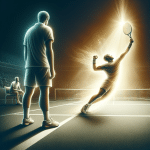In a recent announcement by the International Tennis Federation (ITF), players found themselves divided over the decision to officially bring off-court coaching to the Grand Slams and all ATP and WTA events beginning in 2025.
The debate surrounding this latest change in off-court coaching has sparked controversy among players, with some questioning whether it will “ruin” the sport. The ITF’s decision comes after off-court coaching had been trialed by the tours in various forms since 2017, and had already been implemented at major tournaments. Now, coaches will be allowed to provide brief advice to players in between points using either verbal communication or hand signals, with longer conversations permitted during breaks in play.
The ITF stated that the rule change was aimed at aligning coaching approaches across different international tennis bodies and reducing the burden on chair umpires in enforcing the rules. By standardizing off-court coaching practices, the ITF hopes to make the game more consistent and fair for all players.
Feedback from players, coaches, and other stakeholders, as well as insights from previous off-court coaching trials at various levels of the sport, all contributed to the ITF’s decision. Despite the thorough research and consultation processes, not everyone is on board with the change, particularly some of the top ATP players who voiced their concerns on social media.
Denis Shapovalov, a former world No. 10 and current world No. 95, expressed his disappointment with the new rule, emphasizing the unique challenge and beauty of tennis as a solo sport. Referencing Andre Agassi’s book “Open,” Shapovalov highlighted the special nature of tennis where players are “out there alone,” and questioned the necessity of altering the essence of the game.
As the tennis world grapples with this new development in off-court coaching, the debate is likely to continue among players, fans, and officials as they navigate the impact of this significant change on the sport.






